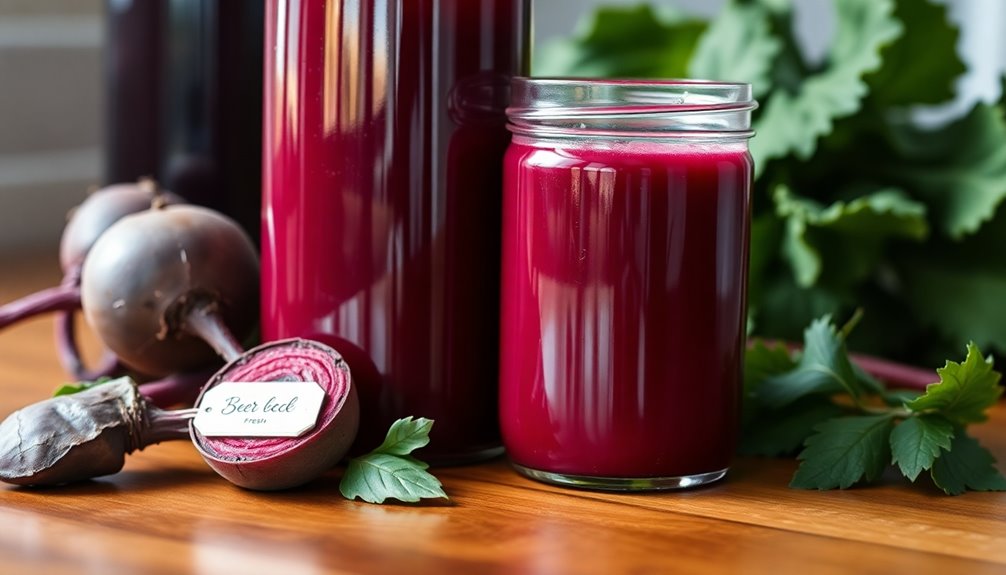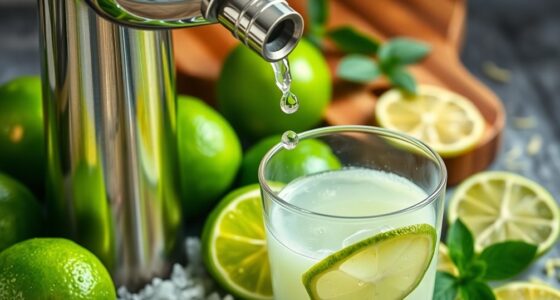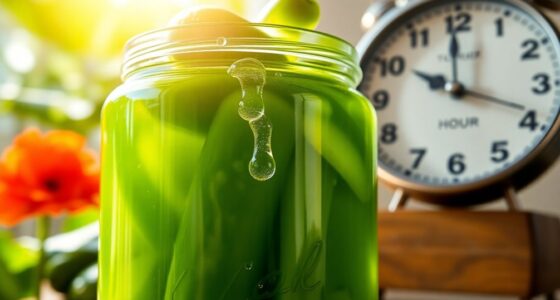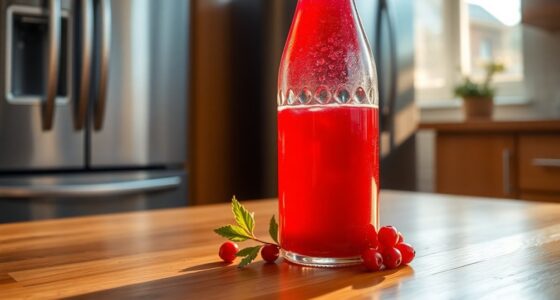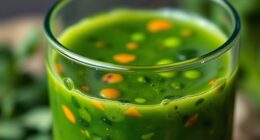Beet juice lasts different lengths in the fridge depending on its state. Unopened store-bought juice can last up to two weeks. Once opened, it stays fresh for about 2-5 days, so store it in an airtight container. Fresh homemade beet juice is best consumed immediately but can last 24-48 hours in the fridge. Freezing it can extend the shelf life to about six months. Want to know more storage tips and tricks?
Key Takeaways
- Unopened store-bought beet juice lasts up to two weeks in the refrigerator if stored properly.
- Opened store-bought beet juice remains fresh for 2-5 days when kept in an airtight container.
- Fresh homemade beet juice should ideally be consumed immediately but can last 24-48 hours in the fridge.
- Freezing beet juice significantly extends its shelf life to about six months when properly stored.
- Always check for signs of spoilage and store beet juice away from light and heat for optimal freshness.
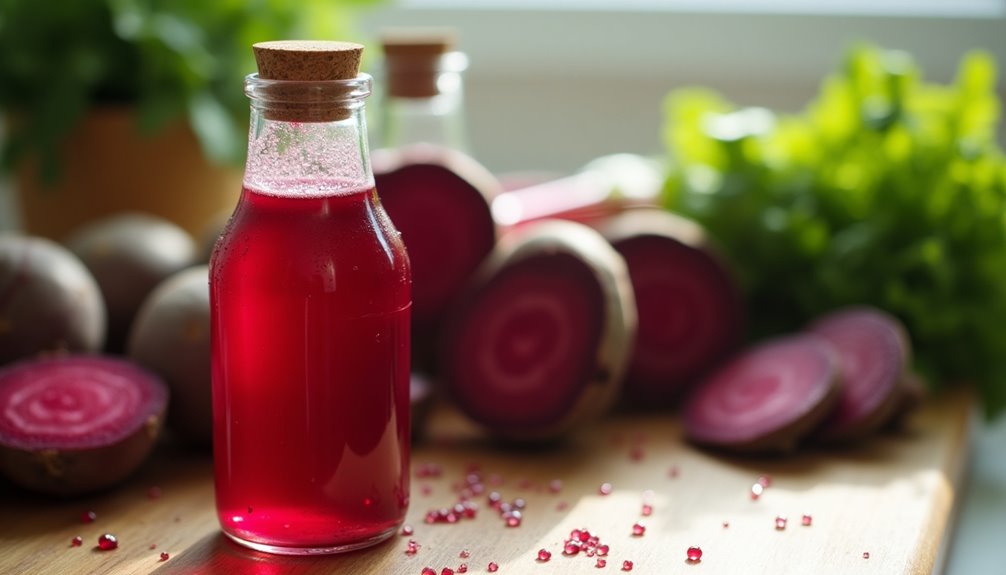
Have you ever wondered how long you can keep beet juice in the fridge? If you love drinking beet juice for its incredible health benefits, you probably want to ensure it stays fresh for as long as possible. Let's break down how long different types of beet juice can last and how to store them properly so you can enjoy that vibrant vegetable juice without any worries.
When it comes to unopened store-bought beet juice, you're in luck. It can last up to two weeks in the refrigerator. So, if you've stocked up on those colorful bottles, you can easily enjoy your beetroot beverage without a rush. Just be sure to check the expiration date on the label, as it's a good indicator of freshness.
Now, if you've opened a bottle of beet juice, things change a bit. Once it's been opened, beet juice typically remains fresh for about 2-5 days. To maximize its shelf life, store it in an airtight container. This will help prevent spoilage and keep your juice tasting as fresh as possible. If you're drinking beet juice regularly, be mindful of the time; you don't want to miss out on those health benefits because the juice has gone bad.
If you've made fresh homemade beet juice, that's even better! Fresh homemade beet juice is best consumed immediately for the best flavor and nutritional value. However, if you need to store it, it can last for about 24-48 hours in the fridge when kept in an airtight container. The longer it sits, the more the nutrients begin to degrade, so it's always a good idea to drink it as soon as you can.
Are you considering making a big batch of beet juice? Freezing beet juice is a fantastic option to extend its shelf life even further. When properly frozen, beet juice can last for about six months. Just pour your homemade beetroot juice into ice cube trays or freezer-safe containers, ensuring you leave some space for expansion. When you're ready to enjoy a refreshing sip, simply thaw the desired amount in the fridge or at room temperature.
Frequently Asked Questions
Does Refrigerated Beet Juice Go Bad?
Yes, refrigerated beet juice can go bad. If you notice a sour smell, darker color, or mold, it's best to discard it immediately.
Unopened beet juice lasts longer, but once you open it, you've got about 2-5 days to enjoy it while it's fresh.
Homemade beet juice is even more perishable, so aim to drink it within 24-48 hours.
Always trust your senses when it comes to checking for spoilage!
When to Stop Drinking Beetroot Juice?
Did you know that nearly 30% of people experience digestive issues after consuming beet juice?
If you start feeling any discomfort, it's time to stop drinking it. Listen to your body; if you notice symptoms like bloating or stomach cramps, take a break.
Also, if the juice tastes sour or smells off, don’t risk it—dump it. Staying mindful of how your body reacts ensures a healthier experience with beetroot juice. In addition, it’s essential to pay attention to the freshness of the ingredients you use when making your juice. If you’re curious about how much juice is in a lemon, knowing this can help you achieve the perfect balance in your recipes. Freshly squeezed lemon juice can enhance the flavor of beetroot juice, providing a zesty contrast that can make it more enjoyable while offering added health benefits.
Do Beets Go Bad in the Fridge?
Yes, beets can go bad in the fridge. If you notice any signs like a mushy texture, dark spots, or a bad smell, it's time to toss them.
Typically, fresh beets last a couple of weeks when stored properly in the vegetable drawer. To keep them fresh longer, store them unwashed and in a breathable bag.
Always check for spoilage before using them in your meals or juices.
How Many Days a Week Should You Drink Beet Juice?
So, you wanna become a beet juice connoisseur, huh?
Well, drink it 3 to 5 times a week for the best results! Start with a modest 4 ounces to see how your body reacts. If you're feeling good, go ahead and increase that intake.
You'll find it especially beneficial on workout days when you need that extra boost.
Just remember, consult your healthcare provider for tailored advice, especially if you have health concerns.
Conclusion
In conclusion, while beet juice can last about 3 to 5 days in the fridge, it's best to consume it fresh for optimal taste and nutrients. You might worry about waste if you can't finish it quickly, but consider making smaller batches or freezing leftovers in ice cube trays. This way, you can enjoy the health benefits without the worry of spoilage, and you'll always have a refreshing boost ready when you need it!
Cindy thoroughly researches juicing trends, techniques, and recipes to provide readers with practical advice and inspiration. Her writing style is accessible, engaging, and designed to make complex concepts easy to understand. Cindy’s dedication to promoting the advantages of juicing shines through her work, empowering readers to make positive changes in their lives through the simple act of juicing.

